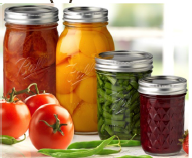 Q. I’ve had a successful year with my vegetable garden and am looking for a class on how to safely can some of my produce. Does the Extension Office have an upcoming class that I can attend?
Q. I’ve had a successful year with my vegetable garden and am looking for a class on how to safely can some of my produce. Does the Extension Office have an upcoming class that I can attend?
A. Yes. Jill Breslawski, UF/IFAS Extension Family and Consumer Sciences Extension Agent for Okaloosa and Walton Counties, is offering a free seminar this Wednesday titled Preserving the Harvest. This seminar is for the new canner as well as experienced preservers. Have you ever wanted to go to a U-Pick farm but don’t know what you’ll do with all the extra produce? Have you grown tired of veggies from a tin can that taste like—well—the tin can? Have an urge to stock your pantry with healthy and wholesome food for your family? This seminar will provide the right information for you.
Learn the different methods of canning; how to ensure a safe end product and much more! Having lots of preserved food, free from additives and oh so tasty is easy, fun and we’ll show you how!
This canning seminar will be held on Wednesday, July 15 from 10 to 11 a.m. at the Extension Annex, 127 West Hollywood Boulevard in Fort Walton Beach. There is no cost to attend but space is limited. Please call 850-689-5850 for more information and to register.
Q. What are the little worms that tunnel into my cucumbers and how can I control them?
A. These are called pickleworms. They can be difficult to control. Planting early and harvesting on a regular basis are good cultural methods to follow in growing cucurbits (cucumbers, melons and squash) to minimize problems with pests. The likelihood of having problems with pickleworms and other pests increases considerably as we move later into the growing season. Because of increased pest pressure and the difficulties of carrying many of the warm season vegetables through the hot summer months, a good gardening practice in Florida is to plant early and get what you can. When the pests and heat become too much, forget about it and do away with the plants. The expense, trouble and stress may not be worth trying to keep a few cucumber plants producing all summer in Florida.
There are insecticides to control pickleworms. Look for insecticides labeled for cucumbers that contain spinosad, Bacillus thuringensis, carbaryl or pyrethroids. Always follow directions on the pesticide label for the crop you are spraying. A regular spray schedule will be needed. Once they are in the individual fruit, spraying won’t help.
Larry Williams, UF/IFAS Extension Agent, Okaloosa County, July 9, 2015
 0
0
